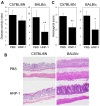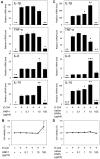Low concentrations of human neutrophil peptide ameliorate experimental murine colitis
- PMID: 27840892
- PMCID: PMC5117768
- DOI: 10.3892/ijmm.2016.2795
Low concentrations of human neutrophil peptide ameliorate experimental murine colitis
Abstract
Human neutrophil peptides (HNPs) not only have antimicrobial properties, but also exert multiple immunomodulatory effects depending on the concentration used. We have previously demonstrated that the intraperitoneal administration of high-dose HNP-1 (100 µg/day) aggravates murine dextran sulfate sodium (DSS)-induced colitis, suggesting a potential pro-inflammatory role for HNPs at high concentrations. However, the role of low physiological concentrations of HNPs in the intestinal tract remains largely unknown. The aim of this study was to examine the effects of low concentrations of HNPs on intestinal inflammation. We first examined the effects of the mild transgenic overexpression of HNP-1 in DSS-induced colitis. HNP-1 transgenic mice have plasma HNP-1 levels similar to the physiological concentrations in human plasma. Compared to wild-type mice treated with DSS, HNP-1 transgenic mice treated with DSS had significantly lower clinical and histological scores, and lower colonic mRNA levels of pro-inflammatory cytokines, including interleukin (IL)-1β and tumor necrosis factor (TNF)-α. We then injected low-dose HNP-1 (5 µg/day) or phosphate-buffered saline (PBS) intraperitoneally into C57BL/6N and BALB/c mice administered DSS. The HNP-1-treated mice exhibited significantly milder colitis with reduced expression levels of pro-inflammatory cytokines compared with the PBS-treated mice. Finally, we examined the in vitro effects of HNP-1 on the expression of cytokines associated with macrophage activation. Low physiological concentrations of HNP-1 did not significantly affect the expression levels of IL-1β, TNF-α, IL-6 or IL-10 in colonic lamina propria mononuclear cells activated with heat-killed Escherichia coli, suggesting that the anti-inflammatory effects of HNP-1 on murine colitis may not be exerted by direct action on intestinal macrophages. Collectively, our data demonstrated a biphasic dose-dependent effect of HNP-1 on DSS-induced colitis: an amelioration at low concentrations and an aggravation at high concentrations. Low concentrations of HNPs may contribute to the maintenance of intestinal homeostasis.
Figures





Similar articles
-
Human neutrophil peptide-1 aggravates dextran sulfate sodium-induced colitis.Inflamm Bowel Dis. 2012 Apr;18(4):667-75. doi: 10.1002/ibd.21855. Epub 2011 Sep 16. Inflamm Bowel Dis. 2012. PMID: 21928371
-
Restoration of mucosal integrity and epithelial transport function by concomitant anti-TNFα treatment in chronic DSS-induced colitis.J Mol Med (Berl). 2018 Aug;96(8):831-843. doi: 10.1007/s00109-018-1658-1. Epub 2018 Jun 20. J Mol Med (Berl). 2018. PMID: 29967942
-
Role of metallothionein in murine experimental colitis.Int J Mol Med. 2013 May;31(5):1037-46. doi: 10.3892/ijmm.2013.1294. Epub 2013 Mar 6. Int J Mol Med. 2013. PMID: 23467591
-
Anti-inflammatory effects of Inonotus obliquus in colitis induced by dextran sodium sulfate.J Biomed Biotechnol. 2010;2010:943516. doi: 10.1155/2010/943516. Epub 2010 Mar 10. J Biomed Biotechnol. 2010. PMID: 20300439 Free PMC article. Review.
-
Human neutrophil peptides: a novel potential mediator of inflammatory cardiovascular diseases.Am J Physiol Heart Circ Physiol. 2008 Nov;295(5):H1817-24. doi: 10.1152/ajpheart.00472.2008. Epub 2008 Sep 19. Am J Physiol Heart Circ Physiol. 2008. PMID: 18805897 Free PMC article. Review.
Cited by
-
Alpha-defensins increase NTHi binding but not engulfment by the macrophages enhancing airway inflammation in Alpha-1 antitrypsin deficiency.Front Immunol. 2025 Feb 12;16:1543729. doi: 10.3389/fimmu.2025.1543729. eCollection 2025. Front Immunol. 2025. PMID: 40013145 Free PMC article.
-
A Synthetic Peptide 2Abz23S29 Reduces Bacterial Titer and Induces Pro-Inflammatory Cytokines in a Murine Model of Urinary Tract Infection.Drug Des Devel Ther. 2020 Jul 17;14:2797-2807. doi: 10.2147/DDDT.S259937. eCollection 2020. Drug Des Devel Ther. 2020. PMID: 32764879 Free PMC article.
-
Lactococcus lactis engineered to deliver hCAP18 cDNA alleviates DNBS-induced colitis in C57BL/6 mice by promoting IL17A and IL10 cytokine expression.Sci Rep. 2022 Sep 19;12(1):15641. doi: 10.1038/s41598-022-19455-3. Sci Rep. 2022. PMID: 36123355 Free PMC article.
-
Mechanisms and regulation of defensins in host defense.Signal Transduct Target Ther. 2023 Aug 14;8(1):300. doi: 10.1038/s41392-023-01553-x. Signal Transduct Target Ther. 2023. PMID: 37574471 Free PMC article. Review.
-
Antimicrobial peptides and the gut microbiome in inflammatory bowel disease.World J Gastroenterol. 2021 Nov 21;27(43):7402-7422. doi: 10.3748/wjg.v27.i43.7402. World J Gastroenterol. 2021. PMID: 34887639 Free PMC article.
References
-
- Wilde CG, Griffith JE, Marra MN, Snable JL, Scott RW. Purification and characterization of human neutrophil peptide 4, a novel member of the defensin family. J Biol Chem. 1989;264:11200–11203. - PubMed
MeSH terms
Substances
LinkOut - more resources
Full Text Sources
Other Literature Sources

